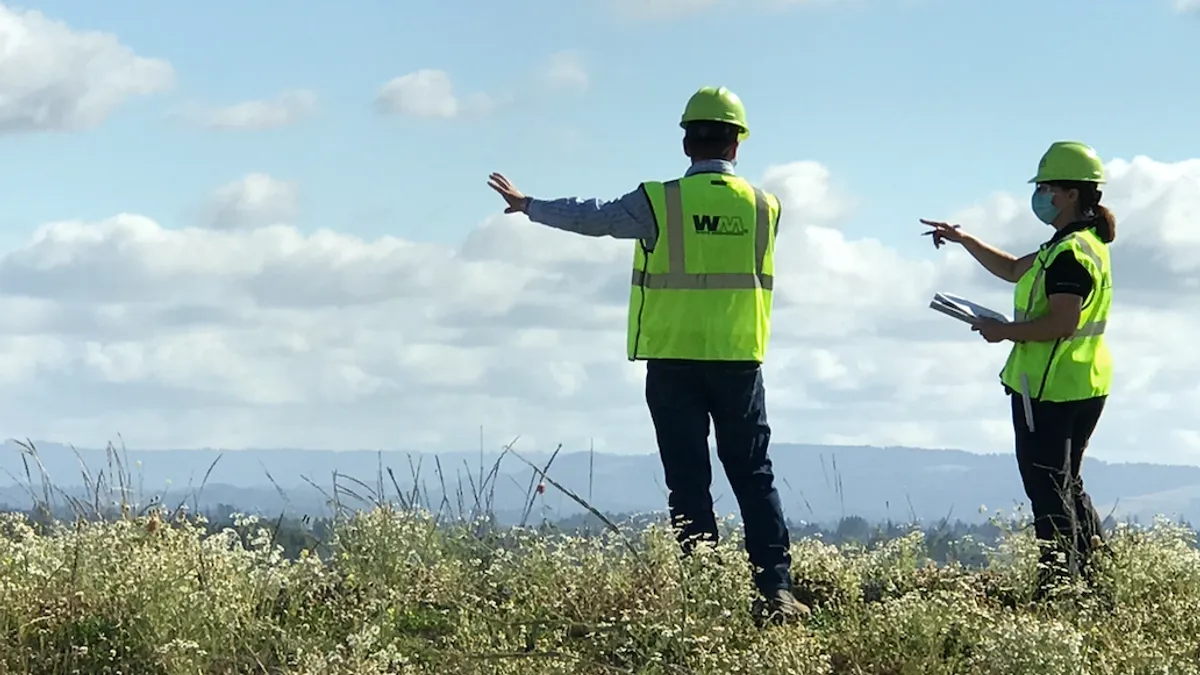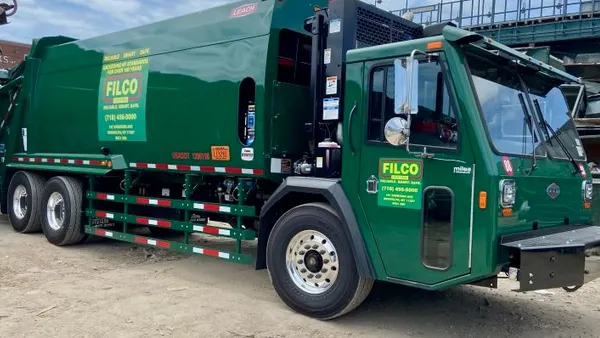2020 Earnings
| Revenue | $15.218B |
| Year-Over-Year Change | 1.53%▼ |
| Net Income | $1.496B |
Q4 Earnings
| Revenue | $4.067B |
| Year-Over-Year Change | 5.75%▲ |
| Net Income | $438M |
Coming off a historic year that included the major acquisition of Advanced Disposal Services, Waste Management closed the book on 2020 with multiple signals it believes North American business activity may be on a sustained upswing.
After experiencing notable impacts to business levels and operations during the pandemic, the waste and recycling industry's largest company reported the fourth quarter was the first in multiple earnings cycles that saw net service increases. And while the company is taking a generally conservative approach in how much economic activity it expects to return by the end of 2021, executives think the sector's recovery potential may be particularly good.
"We haven't gone through something like this where everything shut down and in many cases are still shut down. So whether it’s WM or whether it’s any other waste provider, this industry is a reopen play," said CEO Jim Fish during the company's Thursday earnings call.
COVID economy
- Overall 2020 volumes were down 4.5% (compared to a 2.3% increase in 2019). Fourth quarter volumes were only down 2.6%, as compared to a 5.1% drop in the third quarter, compared to the prior year. Fourth quarter MSW volumes were up 1.7% and C&D volumes were up 1.8%, excluding hurricane activity.
- Chief Operating Officer John Morris estimated around 70% of businesses that changed their service in some form due to the pandemic have since returned, with certain categories still struggling, but noted "we did not see a backslide when COVID cases increased in the fall."
- In signs of ongoing adaptation, Morris reported overtime savings significantly outpaced lower commercial and industrial activity – with room for more cost savings, especially in legacy Advanced business. He also pointed out a $40 million benefit from an ongoing focus on improving residential margins, due in part to a 1.4% quarterly volume decline from dropping certain less profitable business. This comes after multiple quarters of residential volume increases.
Even with the pandemic's effects, Waste Management came through an eventful year – including the conclusion of its $4.6 billion Advanced purchase – on what it described as solid footing.
Annual free cash flow was $2.082 billion, when excluding divestiture proceeds and costs related to the Advanced transaction, which Chief Financial Officer Devina Rankin noted nearly hit the company's original 2020 target. While annual collection and disposal revenue was down $141 million year over year, that category was up by $185 million in the fourth quarter due in large part to acquisition benefits.
The company also highlighted benefits from ongoing pricing increases, particularly in its landfill and transfer station business, but said this activity had been intentionally quieter for commercial customers. Fish said the company made an effort to delay price increases for small business customers that have been most affected by the pandemic, but those customers can expect to see rate changes in the future.
Some of the most affected customer categories continue to include restaurants, travel and lodging, entertainment and schools. Given uncertainty on when volumes across a broader range of categories might return to pre-pandemic levels, executives repeatedly said it was too soon to know how or when the pandemic's economic recovery might play out. Yet as the coronavirus vaccine rollout continues, they anticipate more business activity will follow.
"Our expectation is that those states that are starting to reopen, and even the states that haven’t started, will start to perk up here. We think we’ll be back to some sense of normalcy on the volume front in the back half of 2021," said Fish, later citing positive C&D trends as a potential leading indicator among other signs a boom could be coming as the year progresses. "It feels like this economy is really ready to take off like a space shuttle."
ESG emphasis
- The company's annual recycling revenue of $1.127 billion was up nearly 8.4% over 2019, due to ongoing changes in fee structures as well as a notable uptick in commodity values. It also saw positive trends on renewable natural gas pricing due to stabilizing RIN credit values.
- Fish said this "strong upward trajectory" could be part of a long-term trend, which he believes will be a boost for the company's competitive position. Recycling is expected to provide a $40 million to $50 million tailwind, and the company anticipates a $10 million year-over-year uptick from the sale of RIN credits.
- While executives said plans for ongoing investment in these areas predate the Biden administration, they reiterated prior comments that new federal regulations on environmental issues could potentially benefit operations. Managing PFAS chemicals was one example, with Morris saying that handling contaminated soil from cleanup projects could be a boon for landfills.
- The company is also watching the possibility of a $15 federal minimum wage, and whether it could effectively raise the floor for existing wages above that level, with potential costs likely getting passed along to customers. "If we see that rising tide impact our cost structure, it’s something that we would respond to on the price side of the business," said Rankin.
Looking ahead
- Waste Management estimates it could see $60 million to $75 million worth of synergies from integrating Advanced by the end of 2021, including fourth quarter 2020 benefits, and anticipates the remaining projected synergies will come in 2022. Around one-third of those savings will come from route optimization, which is expected to begin during the second quarter at a one-time cost of $50 million.
- The company anticipates coming in on the lower end of its traditional $100 million to $200 million tuck-in acquisition budget this year, as it focuses on integration, with no plans to consider opportunities in related sectors until at least next year.
- Asked about the future potential for the overall industry seeing other major deals, given the protracted federal approval process for Advanced, Fish indicated those days are likely over. “I really don’t expect that at least WM would do another large solid waste acquisition in North America," he said.
- Looking ahead to 2021, overall revenue growth is expected to be in the 10.75% to 11.25% range, including a 4% to 4.5% uptick from collection and disposal. Free cash flow could reach upward of $2.35 billion.










